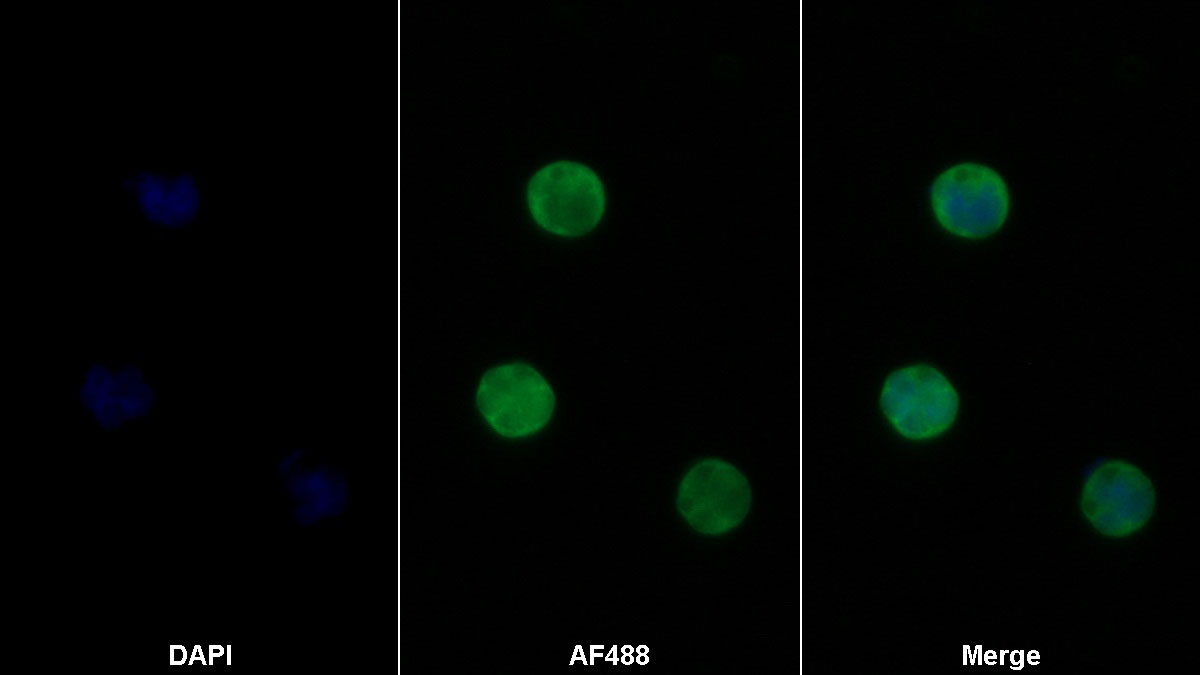Monoclonal Antibody to Dihydropyrimidine Dehydrogenase (DPYD) 

DPD; DHPDHase; Dihydrothymine dehydrogenase; Dihydrouracil dehydrogenase
Overview
Properties
- Product No.MAC012Hu21
- Organism SpeciesHomo sapiens (Human) Same name, Different species.
- ApplicationsICC/IF
If the antibody is used in flow cytometry, please check FCM antibodies.
Research use only - Downloadn/a
- CategoryEnzyme & KinaseMetabolic pathway
- SourceMonoclonal antibody preparation, Host Mouse
- Ig Isotype IgG1Kappa, Clone Number C1
- PurificationProtein A + Protein G affinity chromatography
- LabelNone
- Immunogen RPC012Hu01-Recombinant Dihydropyrimidine Dehydrogenase (DPYD)
- Buffer Formulation0.01M PBS, pH7.4, containing 0.05% Proclin-300, 50% glycerol.
- TraitsLiquid, Concentration 1mg/mL
Sign into your account
Share a new citation as an author
Upload your experimental result
Review

Contact us
Please fill in the blank.
Specifity
The antibody is a mouse monoclonal antibody raised against DPYD. It has been selected for its ability to recognize DPYD in immunohistochemical staining and western blotting.
Usage
Immunofluorescence: 5-20µg/mL;
Optimal working dilutions must be determined by end user.
Storage
Store at 4°C for frequent use. Stored at -20°C in a manual defrost freezer for two year without detectable loss of activity. Avoid repeated freeze-thaw cycles.
Stability
The thermal stability is described by the loss rate. The loss rate was determined by accelerated thermal degradation test, that is, incubate the protein at 37°C for 48h, and no obvious degradation and precipitation were observed. The loss rate is less than 5% within the expiration date under appropriate storage condition.
Giveaways
Increment services
-
 Antibody Labeling Customized Service
Antibody Labeling Customized Service
-
 Protein A/G Purification Column
Protein A/G Purification Column
-
 Staining Solution for Cells and Tissue
Staining Solution for Cells and Tissue
-
 Positive Control for Antibody
Positive Control for Antibody
-
 Tissue/Sections Customized Service
Tissue/Sections Customized Service
-
 Phosphorylated Antibody Customized Service
Phosphorylated Antibody Customized Service
-
 Western Blot (WB) Experiment Service
Western Blot (WB) Experiment Service
-
 Immunohistochemistry (IHC) Experiment Service
Immunohistochemistry (IHC) Experiment Service
-
 Immunocytochemistry (ICC) Experiment Service
Immunocytochemistry (ICC) Experiment Service
-
 Flow Cytometry (FCM) Experiment Service
Flow Cytometry (FCM) Experiment Service
-
 Immunoprecipitation (IP) Experiment Service
Immunoprecipitation (IP) Experiment Service
-
 Immunofluorescence (IF) Experiment Service
Immunofluorescence (IF) Experiment Service
-
 Buffer
Buffer
-
 DAB Chromogen Kit
DAB Chromogen Kit
-
 SABC Kit
SABC Kit
-
 Long-arm Biotin Labeling Kit
Long-arm Biotin Labeling Kit
-
 Real Time PCR Experimental Service
Real Time PCR Experimental Service
Citations
- The upregulation of dihydropyrimidine dehydrogenase in liver is involved in acquired resistance to 5-fluorouracilScienceDirect: S0959804912009835
- The levels of urine CTX-II, C2C, and PYD in children patients with Kashin-Beck disease in Qinghai Province of ChinaPubmed: 30635000






